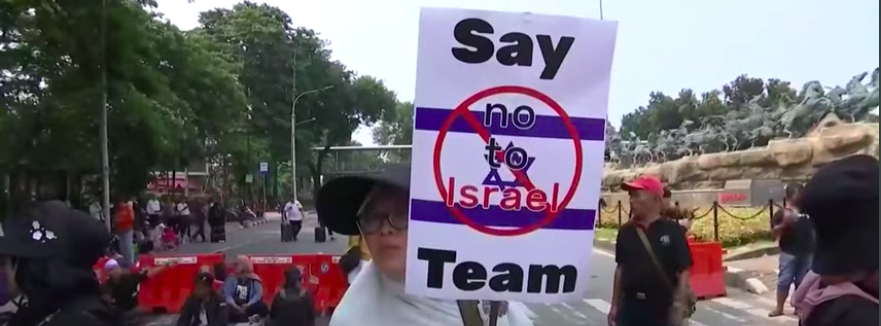IN THE MEDIA
Israel’s U20 World Cup success shows need to fight sports boycotts
June 8, 2023 | Justin Amler

Jerusalem Post – 8 June 2023
Israel’s stunning success in the FIFA Under 20 World Cup in Argentina has been inspirational to so many. A national team made up of Arabs and Jews has shone on the world stage, giving the country the kind of positive news coverage often lacking in international media, whose obsessive focus is too often dominated by the Israeli-Palestinian conflict.
And yet, even in this moment of sporting glory, there remains a more distasteful lingering echo of the discrimination Israel continues to face. The World Cup was supposed to take place in Indonesia, but certain officials, including the governor of Bali, refused to host the Israeli team. If this hadn’t caused FIFA to strip Indonesia of the hosting rights and move the tournament to Argentina, the inspiring story of Israel’s Under-20 World Cup success might never have happened.
Yet this was far from an isolated case. A pattern of boycotts and discrimination against Israeli teams and athletes has been repeated throughout Israel’s 75-year history – the work of those who aim to isolate and delegitimize the world’s only Jewish state, with the hope of turning it into a pariah, and thus contributing to its eventual demise.
The excuse is often given that these boycotts are due to Israeli policies towards the “occupied Palestinian territories” but that rings hollow as these boycotts began long before Israel gained control of the disputed territories in question. In the 1962 Asian Games in Jakarta, Indonesia blocked Israel’s participation, while Sudan refused to play Israel in the 1958 World Cup qualification rounds.
There have been some recent commendable efforts by international sporting bodies to combat these boycotts – as we saw with respect to FIFA and Indonesia – but there have also been recent failures that raise concerns. Ending these offenses, which clearly breach both the letter and the spirit of fair play and fair competition, is essential, and all sports governing bodies need to apply the same consistent approach by rejecting this discrimination.
Encouraging recent examples include FIFA’s decision in 2018 to suspend and sanction the Palestinian Authority’s soccer chief Jibril Rajoub for inciting hatred and violence. Rajoub had tried to force the Argentinian football team to cancel its friendly match in Jerusalem and called for “everyone to burn their Messi shirts and pictures.” The players also faced death threats that the Argentinian foreign minister said were “worse than ISIS”.
IN 2009, Israeli tennis player Shahar Pe’er was denied a visa to play in Dubai, resulting in condemnation from fellow players, including the withdrawal of former world number one Andy Roddick. It also led to the Wall Street Journal dropping its sponsorship of the event.
In 2019, judo’s international body also imposed a four-year ban on Iran’s judo federation over Tehran’s demands that its athletes refuse to compete against any Israeli athletes.
That same year, the International Paralympic Committee (IPC) stripped Malaysia of the right to host a swimming event due to the country’s ban on Israeli athletes.
However, there have also been some recent failures to take appropriate action against similar discrimination.
Earlier this year, the South African Rugby Union disinvited an Israeli team to a tournament due to alleged security concerns. World Rugby accepted the decision, thus setting a dangerous precedent by creating an effective loophole that can enable future discriminatory practices under the guise of security concerns.
Similarly, there was a lenient response towards Lebanon’s athletes who physically blocked their Israeli counterparts from boarding a bus at the 2016 Rio Olympics – which also raised questions about equal treatment and fair play.
Finally, at the Tokyo Olympics in 2021, Sudanese judoka Mohamed Abdalarasool, who did not turn up to face an Israeli opponent, avoided sanctions, while Algerian competitor Fethi Nourine did the same and was banned from future competition. The only difference between them was that Nourine had publicly announced he was boycotting Israeli athletes to support Palestine, while Abdalarasool said nothing. This suggests another loophole boycotters can exploit.
Only with strict and consistent enforcement of existing rules against political boycotts in all sporting codes, leaving no room for loopholes that can be exploited, can this discriminatory behavior be addressed. The rights of athletes should be paramount, as should the integrity of sports itself so that it can remain a platform for unity, respect and healthy competition. Those who contravene that must understand that their actions will lead to severe consequences.
There are few forces in life that can unite people, generate hope and inspire future generations, the way sport does. It should be a unifying force, promoting fair competition and mutual respect among athletes and nations. Discrimination against Israeli athletes contradicts the spirit of sportsmanship and the principles of fair play. Moreover, ultimately, it will always be the fans and athletes who suffer when political considerations and discrimination undermine the integrity of sporting events.
The writer is a policy analyst at the Australia/Israel & Jewish Affairs Council.





